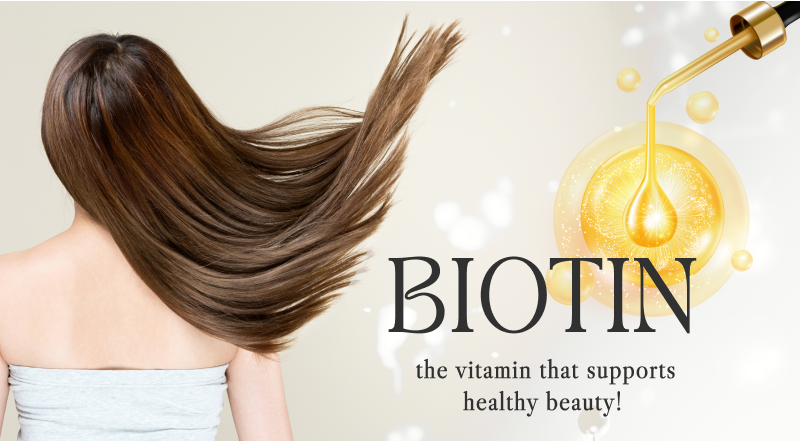
Biotin, also known as Vitamin B7 or Vitamin H, is one of the key nutrients supporting the health of skin, hair, and nails. This water-soluble vitamin plays a crucial role in cellular metabolism, influencing metabolic processes, energy production, and the health of connective tissues. Biotin has gained particular popularity as an active ingredient in supplements and cosmetics that promote beauty.
History of Biotin
Biotin was discovered in the early 20th century during research on nutrition when it was observed that a deficiency in this nutrient led to hair loss and skin peeling. Since then, biotin has been widely used as a supplement to support skin, hair, and nail health, as well as a key component for the proper functioning of the body.
Properties of Biotin
Biotin performs a number of important functions in the body, particularly in relation to the metabolism of proteins, fats, and carbohydrates. Here are its key properties:
-
Skin health – Biotin supports cell regeneration, helping to maintain a healthy and radiant appearance. Regular biotin intake may alleviate skin issues such as dryness and peeling.
-
Hair growth – Vitamin B7 is commonly used in hair growth supplements because it plays a key role in the metabolism of keratin, the primary building block of hair. Biotin helps stimulate hair growth and prevents hair loss.
-
Nail strengthening – Biotin increases the hardness and strength of nails, reducing brittleness. This is particularly important for people with fragile and easily breakable nails.
-
Metabolism support – Biotin plays a vital role in metabolic processes, supporting the metabolism of fats, proteins, and carbohydrates. It is essential for proper energy production in the body
Who Benefits from Biotin?
Biotin is particularly recommended for individuals facing beauty-related issues, such as hair loss, brittle nails, or skin problems. Here’s who can benefit the most from biotin supplementation:
-
People with hair problems: Biotin supplements are often recommended for those suffering from excessive hair loss, alopecia, or weakened, brittle hair.
-
People with brittle nails: For individuals struggling with brittle nails, biotin can help strengthen the nail plate.
-
People caring for their skin: Biotin supports healthy skin, aiding in cell regeneration and reducing issues like dryness and peeling.
-
Athletes and physically active individuals: Biotin is important in the body’s energy metabolism, which can support recovery and performance in active people.
How to Supplement Biotin?
Biotin is naturally present in many foods, such as eggs, nuts, seeds, whole grains, and meat. However, many people opt for supplementation, especially if their diet is lacking in these ingredients.
-
Dosage: The recommended daily dose of biotin is around 30-100 mcg for adults. For hair, nail, or skin issues, biotin supplements offer higher doses, ranging from 5-10 mg per day.
-
Duration of supplementation: To notice results, biotin supplementation should last for at least 3-6 months. Skin, hair, and nails react to supplements with a delay, so patience is needed.
Things to Keep in Mind When Using Biotin
-
Consistency: Biotin supplements should be taken regularly to achieve the desired effects, particularly for hair, skin, and nail health.
-
Biotin-rich diet: It’s worth enriching your diet with foods naturally rich in biotin, such as eggs, almonds, sweet potatoes, and fish, to achieve synergistic effects.
-
Medical advice: It’s always advisable to consult a doctor before starting supplementation, especially if you are taking other supplements or medications that may affect biotin levels in the body.
Side Effects of Biotin
Biotin is a water-soluble vitamin, which means excess amounts are excreted through urine, and the risk of overdose is minimal. However, prolonged use of very high doses may lead to some side effects:
-
Digestive problems: In rare cases, digestive disturbances such as nausea or diarrhea may occur.
-
Interference with test results: High doses of biotin can affect certain lab results, particularly hormonal and cardiac tests.
Biotin and Other B Vitamins
While biotin is often associated with beauty, it is just one of many nutrients in the B vitamin group. Together with other B vitamins, such as B12 and folic acid, biotin plays an important role in metabolism and energy production, making it essential for overall health and well-being.
Conclusion
Biotin, or Vitamin B7, is an essential nutrient for the health of skin, hair, and nails. Regular consumption, whether through supplements or diet, supports the body’s natural regenerative processes, helping to maintain a beautiful appearance and proper metabolism. While considered safe, biotin should be used in moderation and in accordance with professional recommendations.

Comments
No comments.
Add Comment